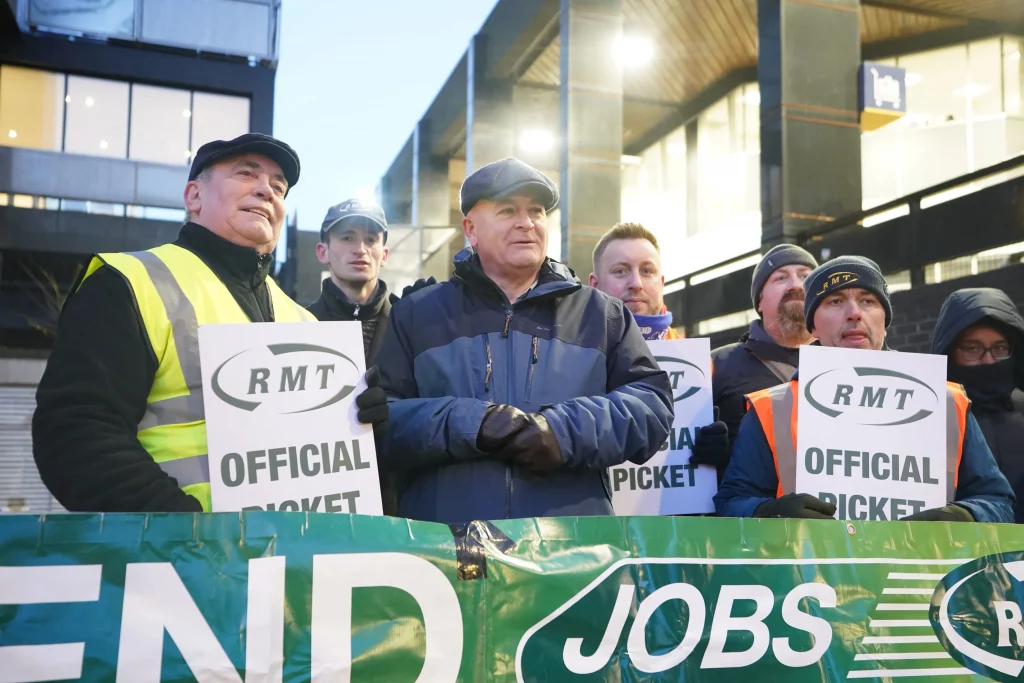The new year of 2023 has brought the wretched hangover of the Conservative party’s bungling of strike action. A hangover nonetheless caused by their own greed and spirited defiance against offering some ease-of-living for this country’s most essential workers.
Previously, in June of 2022, I wrote about how swiftly the striking workers of the RMT been vilified by every corner of the British establishment. At the end of the piece, I wrote: “One struggle is everyone’s struggle!”. This has undoubtedly rung true, as a myriad of other unions and workforces began wider industrial action.
As these strikes have continued, much remains the same, with the exception of the individuals employed at Number 10, Downing Street. Still too remain the demands of the RMT, who face ever-grosser smears from the media and government personnel.
At the heart of these attempts are the interpretation on what the general public are feeling about the strikes. Amongst all the slating of almost all sectors of workers on strike over the new year, are we able to assess whether the public’s support has remained at a stable level? And does public support really matter for strike action success?
To even begin to analyse this, we must recognise the interesting conditions that make industrial action in Britain far trickier to implement than in a number of other European countries. Firstly, a great deal of the population still rely on print media for their news. Unlike other places, the newspaper barons of long ago have survived in a higher proportion through the era of digitisation. In comparison to the United States, where the most prominent and devising media sources such as CNN and Fox News are television networks. The faith that the older British public hold in their newspapers remains, even if that news is now consumed in a digital format. This is what can be drastic for how the general public reacts to continual strike action.
This can be demonstrated from external sources. Although also hardly a balanced media organisation, The New York Times reported that support for strike action remained high in the festive period, using data collected by YouGov. Despite a number of articles using this data as source, this has not been the angle or headline that the right-wing British media has taken up.
Another unique and comparative aspect of UK strike action is the perception of trade unions. The media in this country, egged on by some on the left, like to pretend that all members of a trade union and particularly those in executive roles are ‘raging commies’. This is obviously false. Trade unions should remain, for now, vestiges for greater equality and prosperity for members of the working-class, attended and supported by all socialist movements. This perception isolates those engrained by eras of anti-communist propaganda from supporting strike action and engaging with their own trade unions, therefore diminishing their potential revolutionary capacity.
Emotivity and the option for blame are a huge challenge for the perception of trade unions. As previously mentioned in my June piece, actors against the strike action have continually played dumb. The media has frequently given voice to the singular individuals, particularly in the case of the train strikes, whose lives have been disrupted (and typically only very mildly) by strike action. Their emotion overrules, and therefore end up seeing the trade unions and their actions as the independent actors amongst the disruption, instead of the fatuousness of the government.
How can trade unions confront these? To a rather large degree trade unions in this country are already doing. The RMT has been one of the most vocal and ‘militant’ unions since the beginning. Mick Lynch’s appearances just about everywhere have made him the frequent bogeyman for the sorry state of Britain, however it is easy to see how his honest conviction and witty confidence has rallied the sympathy of the British people. The majority of the general public still support the strikes, even now, after months of media attacks. Striking nurses and health workers unsurprisingly have received the greatest proportion of support from the public, without needing the same level of justification for their actions
Despite all this, should public opinion matter to trade unions? No. It’s certainly present in the consciousness of the actors amongst striking workers about the disruption that is being caused by their action. However, this is not a reason to condemn what newspapers in the UK would label as ‘selfishness’, but instead admire the bravery that is required amongst the unique and often unobservable challenges that are seen by industrial action. The admiration of this bravery that the greater proportion of the British public and its working-class have for these striking workers, whether they are a part of it or not, is being reciprocated. Justly, this admiration is also reciprocated by the entire socialist movement and the YCL!
Howard Green is a member of the YCL’s East of England branch



